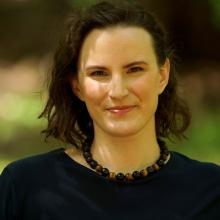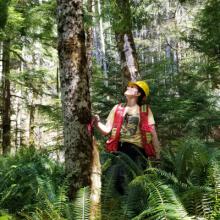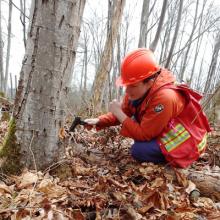Debra Wertman
Why did you decide to pursue a graduate degree?
The pursuit of knowledge is one of my core values, and I aspire to the independence that a doctoral degree could afford me as a researcher. I greatly look forward to one day leading my own research program and mentoring students as we continue to pose critical questions relevant to forest entomology. My career objective is to use forest insects as model systems for the investigation of hypotheses that remain elusive within the broader field of evolutionary ecology.
Why did you decide to study at UBC?
UBC has an excellent international reputation for producing innovative scholars, and the Faculty of Forestry is no exception. Throughout its history, the Faculty has educated numerous influential figures in forestry, including notable forest entomologists. I completed my previous degrees (BFA in Visual Arts, BSc, and MSc in Biology) at the University of Victoria and it was ideal for me to remain on the south coast of beautiful British Columbia.
What is it specifically, that your program offers, that attracted you?
The Forest Insect Disturbance Ecology Lab (FIDEL) in the Department of Forest and Conservation Sciences is directed by renowned forest insect ecologist Dr. Allan Carroll, whose research interests align closely with my own. The Faculty of Forestry and the wider UBC community provide remarkable support to graduate students as they pursue their degrees.
What was the best surprise about UBC or life in Vancouver?
Vancouver is a beautiful city, and although my primary residence is in Victoria (on nearby Vancouver Island), I have greatly appreciated the time I have been able to spend working at and staying near UBC. Engaging with colleagues and friends in a larger city has been a lot of fun.
What aspect of your graduate program do you enjoy the most or are looking forward to with the greatest curiosity?
I have always been curious about the evolutionary outcomes of biological interactions, and how and why organisms evolved specific ecological traits. The functions of symbioses in nature are particularly interesting to me, as forest disease complexes (insect–pathogen) that are innocuous in their native ranges can sometimes become damaging to ecosystems in their introduced ranges.
What do you see as your biggest challenge(s) in your future career?
The competitive climate of academia, particularly the search for a tenure-track faculty position with a reputable university, is a challenge that could be compounded by the 2020 global pandemic. Women continue to make breakthroughs in our roles as scientists and researchers, and we all must strive to correct all types of systemic inequalities that persist across disciplines.
How do you feel your program is preparing you for those challenges?
I feel that my PhD has afforded me the opportunity to operate my own “mini-research program,” which will be of great benefit to my future career. Experience instructing Forestry (Biotic Disturbances) labs has increased my fondness for teaching and shifted my focus to developing different teaching strategies, particularly during the 2020 transition to online learning.
What aspects of your life or career before now have best prepared you for your UBC graduate program?
I have had an extended journey throughout higher education, having completed two undergraduate degrees and a master’s degree before coming to UBC. I firmly believe that there is no wasted education and that skills and knowledge acquired in one discipline can be transferred to others. The support of my mentors (from the University of Victoria and the Canadian Forest Service) and family greatly assisted my progress, and I could not have made it this far in my education without them.
What do you like to do for fun or relaxation?
I enjoy taking photographs of wildlife (insects and birds), vegan cooking, film theory (horror), listening to rock and roll, and spending time with my miniature schnauzer, Wayne.
What advice do you have for new graduate students?
Take time to work in different environments before commencing a graduate program – discover what you love to do! Choose your program and research area carefully, graduate degrees are a large investment of time and you should feel supported and engaged throughout your program. Supervisory styles and lab environments vary widely and can greatly affect your experience as a graduate student, so do some investigation before you accept an offer.


